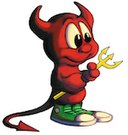4.4BSD-Lite
 Beastie, the mascot of the Berkeley Software Distribution |
|
| Developer | Computer Systems Research Group, University of California, Berkeley |
|---|---|
| Written in | C |
| OS family | Unix |
| Working state | Superseded by derivatives (see below) |
| Source model | Historically closed source, gradual transition to free software from 1991 on. |
| Initial release | 1977 |
| Latest release | 4.4-Lite2 / 1995 |
| Available in | English |
| Platforms | PDP-11, VAX, Intel 80386 |
| Kernel type | Monolithic |
| Userland | BSD |
| Default user interface | Command-line interface |
| License | BSD licenses |
| Official website | www |
Berkeley Software Distribution (BSD) is a Unix operating system derivative developed and distributed by the Computer Systems Research Group (CSRG) of the University of California, Berkeley, from 1977 to 1995. Today the term "BSD" is often used non-specifically to refer to any of the BSD descendants which together form a branch of the family of Unix-like operating systems. Operating systems derived from the original BSD code remain actively developed and widely used.
Historically, BSD has been considered a branch of Unix, Berkeley Unix, because it shared the initial codebase and design with the original AT&T Unix operating system. In the 1980s, BSD was widely adopted by vendors of workstation-class systems in the form of proprietary Unix variants such as DEC ULTRIX and Sun Microsystems SunOS. This can be attributed to the ease with which it could be licensed, and the familiarity the founders of many technology companies of the time had with it.
Although these proprietary BSD derivatives were largely superseded by the UNIX System V Release 4 and OSF/1 systems in the 1990s (both of which incorporated BSD code and are the basis of other modern Unix systems), later BSD releases provided a basis for several open source development projects that are ongoing, e.g., FreeBSD, OpenBSD, NetBSD, Darwin, and TrueOS. These, in turn, have been incorporated in whole or in part in modern proprietary operating systems, e.g., the networking code in Windows NT 3.1 and most of the foundation of Apple's macOS and iOS.
...
Wikipedia
